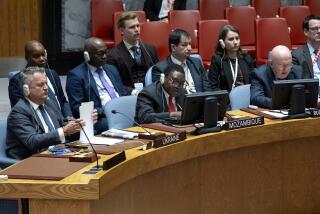U.S. Ties 1991 Talks to Soviet Rights Progress : White House Sees Conference OK as a Move to Keep Kremlin on Course
- Share via
The Reagan Administration said Wednesday that the participation of the United States in a human rights conference in Moscow in 1991 will depend on continued Soviet movement toward international human rights standards.
Formally announcing President Reagan’s decision to approve participation in the meeting, along with U.S. representation at human rights conferences this year in Paris and next year in Copenhagen, a White House spokesman said that the decision is seen as a means of encouraging the Soviet Union to continue on the course it has chosen over the last three years. In that time, emigration has been allowed to increase significantly and the jamming of Western radio broadcasts to the Soviet Union has ceased.
“The Soviet Union now has a unique opportunity to take further action to demonstrate its continuing and irreversible commitment to achieve commonly accepted human rights standards,” said Deputy White House Press Secretary Roman Popadiuk.
The decision, perhaps one of the last major ones regarding the Soviet Union that Reagan will make during his presidency, reflects the distance the President has traveled in his view of the Soviets, as well as the underlying suspicion with which he continues to regard them.
Reagan, who took office eight years ago viewing the Soviet Union as an “evil empire,” remains skeptical of Soviet intentions. He said three weeks ago that, despite the “heady, inspiring” progress made, “we’ve got to proceed by watching whether deeds match the words.”
But by announcing that U.S. representatives would take part in a human rights conference in Moscow, clearly a potential public relations victory for the Soviet Union, the President was giving a diplomatic pat on the back to the Kremlin leadership, although his decision could be reversed at any time during the next two years by the incoming Administration of President-elect George Bush.
Reviewed Decision
A Bush spokesman said in Washington that “we were consulted and aware of this announcement.” He added that before the decision was made, the Reagan Administration reviewed it with the President-elect, his secretary of state-designate, James A. Baker III, and Brent Scowcroft, Bush’s choice for national security adviser.
The human rights conferences would bring together representatives of the members of the North Atlantic Treaty Organization and the Warsaw Pact. The meetings would be part of the continuing Conference on Security and Cooperation in Europe, which began in Helsinki, Finland, in 1975.
Speaking with reporters in Beverly Hills while Reagan wound up a nearly two-week vacation at his new home in Bel-Air, Popadiuk said that the President decided to accept the schedule of human rights conferences, beginning in Paris later this year, “as a means of encouraging continuation of the significant progress in human rights that has taken place in the Soviet Union over the past three years.”
The spokesman singled out “the release of hundreds of political prisoners and exit permission for many people long refused the right to emigrate.”
U.S. officials have said in Moscow that the United States would accept about 50,000 to 60,000 Soviet emigres this year--perhaps twice the number who arrived in the United States in 1988--reflecting the upsurge in departures from the Soviet Union. And, in another human rights issue often cited in the past by the United States, the jamming of the Voice of America, Radio Liberty and other Western broadcasts has been halted.
Popadiuk described as “crucial” new laws respecting individual liberties that Soviet President Mikhail S. Gorbachev has promised to establish as well as “the institutionalization of reform.”
More to Read
Sign up for Essential California
The most important California stories and recommendations in your inbox every morning.
You may occasionally receive promotional content from the Los Angeles Times.













